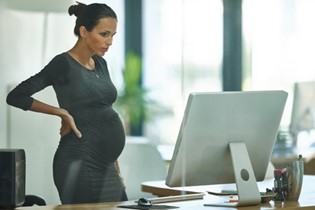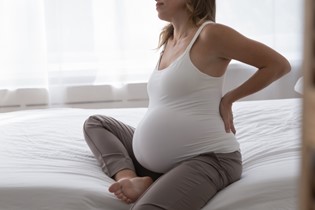How to increase your chances of conceiving

If you're trying to get pregnant, you've likely been inundated with advice on what you should be doing to increase your chances of conception. Fertility specialist Dr Richard Fisher looks at the options.
Most of us plan for events of significance in our lives. Such relatively uncomplicated things like birthday parties and holidays often consume the most planning effort. Buying a house takes a degree of financial planning, but it always surprises me how spontaneous the decision to buy a particular house can be. Getting pregnant, likewise, should be a planned event, but the vagaries of biology often make the particular timing difficult, even if the intent is clear.
Unplanned and unwanted conceptions are clearly a social tragedy, with significant risks to children conceived and grown in an environment full of physical risk factors. Planned pregnancies, however, are now coming under more scrutiny as well, as medicine moves towards a further clinical and research sub-speciality of peri-conceptional medicine. There is increasing recognition that parents' behaviour and habits around the time of conception can have significant short-and long-term effects on their fetus and child.
There is no greater gift parents could give their children than healthy sperm and healthy eggs, and to reach this goal, you have to understand the environment in which those gametes grow and in which a resultant embryo will also be nurtured.
It is commonly stated that we live in a child-centred society, and I daresay that most of us think we do. We can always point at the exceptions as if they are not our problem. The vulnerable in our society are so often children, and we as a community owe them all a duty of care.
The recent debate about folate supplementation in bread to help prevent neural tube defects like spina bifida points to our ambivalence about this. Middle-class opposition to such fortification was based around an argument about individual choice and our ability to protect our own children by taking the supplements we choose. It is so often not the children of the middle class who are at major risk, however, for, with some exceptions, those most at risk are born to parents who have poor nutritional status, quite apart from a genetic predisposition. If we are to protect those children, then we should bear some community responsibility for this by accepting that supplementation of bread with folate is a way in which we might significantly reduce the risk for someone else's children, rather than care about our own alone.
There is evidence that we now live in a society in which our nutritional status is worse on average than it used to be. Like those with poor nutrition, those who live in nutritional plenty are now beginning to reap the adverse side effects of that. It is not just the risk of Type 2 diabetes that is the problem, but being overweight or obese affects the underlying chance of fertility for both men and women. Recent studies from the University of Adelaide have shown that couples having IVF had clinical pregnancy rates which were significantly reduced, as both maternal and paternal body mass index increased quite independently of each other. Of particular interest in one of these studies was that approximately 80% of all men in this unselected group were overweight or obese, and this posed the question about what effect paternal weight might have on the chance of natural conception.

For overweight and obese women, not only did they have a smaller chance of being pregnant, but the pregnancies which resulted had more complications as well as more adverse effects on the newborn in terms of growth, development and the rate of congenital abnormality. Neural tube defects, heart abnormalities, and complex abnormalities are significantly increased in the children of obese and overweight women. If a medication had the same adverse effect on fetal abnormality as obesity does, we would certainly ban its use.
Animal studies have shown that weight alone is not the only determinant of outcome, but also the type of food consumed at the time of conception is important. Animal work at the Liggins Institute in Auckland has shown that mothers fed a high-fat diet at the time of conception had babies who went through puberty earlier and had higher levels of total body fat and altered levels of sex hormones. How well they were looked after or fed after birth had little effect on those parameters.
Other work from the Liggins Institute has shown that sheep that are underfed leading up to conception have lambs that are born prematurely. Premature lambs then have significant risk of obesity and Type 2 diabetes themselves as they mature. What is just as disturbing is that their offspring - a further generation - are also more likely to be obese and develop diabetes.
Intergenerational effects of problems in pregnancy are likely to become more commonly recognised with continuing research. Clearly, peri-conceptional nutrition is an area ripe for future research. A well-rounded, healthy diet would seem appropriate, although how to define this diet is difficult.
Our concern about healthy eating, however, often leads us to irrational behaviour. Around 50% of couples presenting at Fertility Associates are already taking supplements of some sort. In the world of complementary medicine, marketing seems to trump science on all occasions. With the exception of folic acid, there is little evidence that supplementation of vitamins in someone ingesting an otherwise healthy diet does little more than make expensive urine. The concern that not taking supplements might be harmful is seldom balanced by the question as to whether taking them is actually harmful. There is evidence that high supplementary levels of vitamin A in pregnant women is potentially harmful, and vitamin A has been shown to be associated with an increased risk of congenital heart defects.
A question has been raised about the use of vitamin E for the same reasons, although the evidence is much less clear. The fact that a vitamin occurs naturally and that in some specific people replacement of inadequate levels of particular vitamins have positive health outcomes does not mean that supplementing all diets is necessarily beneficial. Developing a concept that both food and vitamin supplements are drugs will be, I think, a significant advance in ensuring that the environment in which conception occurs is as healthy as possible. While we have printed warnings about the health effects of adverse factors such as cigarette smoking; perhaps it is time to issue a warning on supplements that says, "There is no evidence that taking this supplement will do you any good."
Over the last decade, a considerable amount of data has become available about sperm and sperm function. Recent data looking at the fragmentation of DNA in sperm and its association with a decrease in function has led to a search for effective treatments in men whose sperm exhibits such abnormalities. The presence of DNA fragmentation is correlated with oxidative stress, and the finding that the use of some antioxidants can reduce the presence of reactive oxygen species, which cause this stress, has led to considerable research effort.
The extrapolation of findings in a small study, which showed men who had poor sperm counts and motility in IVF cycles being treated with micro-injection led to better pregnancy rates, has led to a marketing explosion supporting the use of antioxidants in all men trying to conceive. Although there is no data suggesting these might be harmful, the people whom we think will benefit from the use of antioxidants are those with a defined problem, and we have no knowledge about whether otherwise normal men will be similarly advantaged or disadvantaged.
The fear of "missing out", together with sophisticated marketing, makes the use of supplements for "support" and "assistance" in conception a fertile ground for exploitation. For some time it has been known that vitamins C and E (both antioxidants) can alter sperm function. There is limited data as to whether it makes a difference to the chance of conception. There is no data at all as to whether cheap products are any worse than an expensive product with the designated use for supporting male sperm health.
The whole area of sperm function is very important and, more than ever, focus is being placed on the male to see what we can do about improving pregnancy outcomes. The production of reactive oxygen species in abnormal environments may be the key to deterioration in sperm function, and the use of antioxidants may prove helpful in mopping these up. Antioxidants are found in foods, particularly in highly coloured vegetables and fruits, but the effect of improved nutrition in men, either in humans or in the animal species, has not been subject to the same scrutiny as in women. Oxidative stress, however, is known to be associated with smoking and some dietary deficiencies, excessive alcohol consumption and extremes of exercise. The way to resolve these problems is certainly to remove the stressors rather than treat the subsequent problem. Age and chronic disease also cause oxidative stress, and although the latter may be alleviated, the former is a terminal disease.
Smoking cigarettes has long been suspected as a cause of decreased fertility, and the increased incidence of problems in offspring. There is now clear evidence. Not only does male smoking decrease the chance of conception, it also increases the risk of miscarriage in the partners of men who smoke. More recent evidence also shows that women living in a smoking environment take longer to conceive due to the effect of passive smoking, and that there is an increased incidence of birth defects in their children.
Alcohol use in men also shows a correlation between the amount ingested and the chance of conception in both men and women, quite apart from its recognised effects in pregnancy.
So where does all this evidence leave us? Clearly, external influences like smoking and alcohol are risk factors to avoid. Being either overweight or underweight is undesirable in mothers and may affect their offspring, and certainly being overweight in men will reduce the chance of conception, and is probably associated with an increase in congenital abnormalities in their children.
The influence of particular types of diet is likely to become much clearer over the next few years. Our desire to do our best will probably mean that we continue to consume large amounts of unnecessary supplements, but it may take some time until we are sure they are really safe.
The goal of healthy sperm and healthy eggs is one which we are still some way away from achieving. We should change those factors we can, steer away from the extremes of dietary advice and practice, and eat as healthily as possible. We should not allow ourselves to over-medicate with unproven supplements until we can be more certain that they are truly beneficial, but embrace those like folic acid which we are sure can be.
Getting pregnant need not be a military exercise, but careful planning is likely to lead to the best outcome for our children.
Dr Richard Fisher (FCROG, FRANZCOG, CREI), together with Dr Freddy Graham, established Fertility Associates in 1987 after previously starting up New Zealand's integrated infertility medicine group at National Women's. He is New Zealand's foremost medical spokesperson on matters of reproductive health, and has been an advocate for better access to care for couples with infertility throughout his career.

AS FEATURED IN ISSUE 9 OF OHbaby! MAGAZINE. CHECK OUT OTHER ARTICLES IN THIS ISSUE BELOW

















